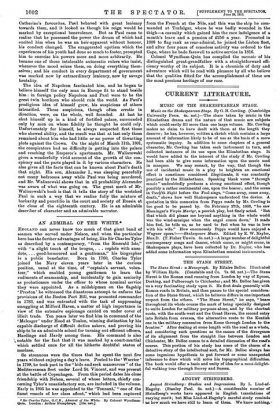AN ADMIRAL OF THE WHITE.*
ENGLAND can never know too much of that giant band of seamen who served under Nelson, and when the particular hero has the further advantages of being, like Sir Charles Tyler as described by a contemporary, "from the Emerald Isle," with " a slight touch of the brogue, . . . replete with anec- dote, . . . good-humoured and a gentleman," his biographer
is a public benefactor. Born in 1760, Charles Tyler joined the Navy eleven years later in the curious position, usual at the time, of "captain's servant, volun- teer," which enabled young gentlemen to learn the rudiments of seamanship, and incidentally to gain seniority as probationers under the officer to whose nominal service they were appointed. As a midshipman on the flagship Preston' he witnessed the disastrous attempt to enforce the provisions of the Boston Port Bill, was promoted commander in 1783, and was entrusted with the task of suppressing smuggling at Milford Haven, a matter of high importance in view of the extensive espionage carried on under cover of illicit trade. Ten years later we find him in command of the `Meleager' under Hood at Toulon, winning distinction by his capable discharge of difficult duties ashore, and proving his ship to be an admirable school for turning out efficient officers, Hardinge and Hardy among them. His command is also notable for the fact that it was marked by a court-martial which settled once for all the hitherto doubtful status of marines.
So strenuous were the times that he spent the next five years without enjoying a day's leave. Posted to the' Warrior' in 1799, he took part in the " hide and seek manceuvres" of the Mediterranean fleet under Lord St. Vincent, and was present at the battle of Copenhagen. From this period dates his close friendship with Nelson, several of whose letters, chiefly con- cerning Tyler's unsatisfactory son, are included in the volume. Early in 1805 he was appointed to the Tonnant,' "one of the finest vessels of her class afloat," which had been captured
P Sir Charles Tyler, G.C.B., Admiral of the White. By Colonel Wyndham- Quin., London : Arthur Humphreys. [10s. net.] from the French at the Nile, and this was the ship he com- manded at Trafalgar, where he was badly wounded in the thigh—a casualty which gained him the rare indulgence of a month's leave and a pension of £250 a year. Promoted in 1808 to flag rank as rear-admiral, he joined the Lisbon fleet, and after four years of ceaseless activity was ordered to the Cape, where be bade farewell to active service in 1816.
Colonel Wyndham-Quin has compiled the memoir of his distinguished great-grandfather with a straightforward effi- ciency worthy of its subject. It is a chronicle of duty and adventure which will be read with pleasure by all who believe that the qualities fitted for the accomplishment of these are the most precious heritage of our race.


























































 Previous page
Previous page